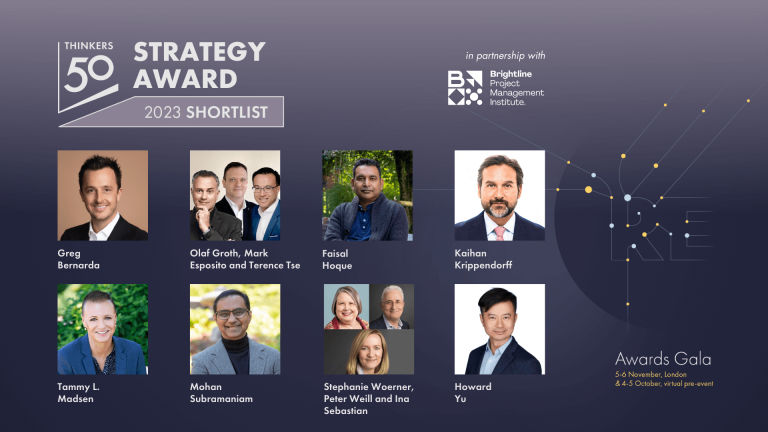


At the heart of strategy a la Michael Porter is the idea of competitive advantage. In the halcyon days of the 1960s and 1970s, such advantages always had a hint of permanence. Companies got ahead and stayed there.
And then, skeptical academics and more challenging times provided a new take on the notion of competitive advantage. Leading the charge was Richard D’Aveni. To D’Aveni, corporate survival was bound up with a series of “dynamic strategic interactions.” Firms made their strategic moves only to have them countered by competitors, to which the firm sought a different advantage, and was countered once more – and so on. This was the world of Hypercompetition — an environment where advantages are rapidly created and eroded.
As D’Aveni wrote in Hypercompetition: Managing the Dynamics of Strategic Maneuvering: “Advantages last only until competitors have duplicated or outmanoeuvred them. ….protecting advantages has become increasingly difficult. Once the advantage is copied or overcome, it is no longer an advantage. It is now a cost of doing business. Ultimately the innovator will only be able to exploit its advantage for a limited period of time before its competitors launch a counterattack. With the launch of this counterattack, the original advantage begins to erode, and a new initiative is needed.”
The strategic goal of organizations in the hypercompetitive world, says D’Aveni, is to “seize the initiative through creating a series of temporary advantages”. Organizations keep ahead of competitors by a perpetual leapfrogging from one temporary advantage to the next, creating new advantages and eroding those advantages held by competitors as they go.
The concept of hypercompetition came about because of a vacation D’Aveni took in Cape Cod. “A hurricane came along called Hurricane Bob,” D’Aveni recalls, laughing. “While I was there it knocked out all the electricity for about four days. When the electricity came back on CNN was running a program on the fall of the Soviet Union. I had no idea that something like that could happen in a few days. It was one of the most important, economic, and political changes of our generation.
“So I stepped back and said to myself, I’m teaching all of these students about long-term plans and consistent strategies, how do you really do that in a world where significant earth shattering changes appear overnight? How do you do that when, even if you had all the resources of the Central Intelligence Agency, you still couldn’t figure out that it was going to happen? I thought to myself, I must be a fraud, and decided to sit down and write a book that was about unsustainable advantages in an unpredictable world, rather than the traditional view of strategy.”
D’Aveni reflects that “the world has become even crazier since 1994, it’s really hypercompetition on steroids today”.
Others are also taking aim at the central premise of Porterian strategic logic. Rita McGrath is a professor at Columbia University Graduate School of Business. Like D’Aveni, she argues that the days of sustainable competitive advantage are numbered.
Before executives head for the hills in fright, there is some reassurance from McGrath: “There are still pockets of the economy where you can find the sustainable advantage. So if you take Rolls Royce or Steinway pianos or something like that, they’re niche businesses where the brand really matters or the customers are super loyal or, businesses like Boeing where it’s just really, really hard to build airplanes. So I still think there are places where you can find sustainable advantage and the traditional tools I would say work pretty well in those places. But we have to grapple with the fact that less and less of the economy is represented by those kinds of industries, with those kinds of characteristics.”
McGrath is the author of The End of Competitive Advantage: How to Keep Your Strategy Moving as Fast As Your Business (2013). In an earlier book, Discovery-Driven Growth, McGrath explores how businesses can pursue dynamic growth, and encourage innovative new ventures without jeopardizing the enterprise through undue risk taking. She provides tools and processes to allow businesses to successfully exploit their opportunities. In The End of Competitive Advantage, she goes further.
“Well, if you think about the models and frameworks that had an impact on the field in the last 20 or 30 years, what’s really new? We’ve had a lot of reliance on frameworks from the past that worked for a different era. I can’t think of anything that’s really had a big impact in the last 20 years. And I think that’s because we’re still looking for this mythical thing called a sustainable competitive advantage, and if you can’t find one of those then what do you do?” says McGrath.
And if competitive advantage is no longer sustainable then we really are talking about redefining the whole nature of strategy, aren’t we?
McGrath nods in agreement. “Getting rid of the sustainable concept does redefine the entire competitive landscape. And I think what we’re going to see in the future is firms that succeed over the long run are going to be really good at finding ideas, developing those ideas into business concepts, launching those business concepts, doing the exploitation thing, which is what strategy was always all about, but then also disengaging. And where I think firms need to change is to develop both the front end, the innovation incubation launch base, as well as the back end, the disengagement phase.
And so what you’re going to be seeing is almost as though they’re surfing through these waves of advantage. You’ll have one wave come and then it goes away, another wave come and then it goes away. And firms that are good at surging competitive advantage are going to be OK with that.”
It is truly hypercompetition on steroids.
This was originally published in What we mean when we talk about strategy by Stuart Crainer and Des Dearlove (Infinite Ideas, 2016).

Thinkers50 Limited
The Studio
Highfield Lane
Wargrave RG10 8PZ
United Kingdom

Thinkers50 Limited
The Studio
Highfield Lane
Wargrave RG10 8PZ
United Kingdom

| Cookie | Duration | Description |
|---|---|---|
| LANG | 9 hours | Linkedin set this cookie to set user's preferred language. |
| nsid | session | This cookie is set by the provider PayPal to enable the PayPal payment service in the website. |
| sp_landing | 1 day | The sp_landing is set by Spotify to implement audio content from Spotify on the website and also registers information on user interaction related to the audio content. |
| sp_t | 1 year | The sp_t cookie is set by Spotify to implement audio content from Spotify on the website and also registers information on user interaction related to the audio content. |
| tsrce | 3 days | PayPal sets this cookie to enable the PayPal payment service in the website. |
| x-pp-s | session | PayPal sets this cookie to process payments on the site. |
| __cf_bm | 30 minutes | This cookie, set by Cloudflare, is used to support Cloudflare Bot Management. |
| Cookie | Duration | Description |
|---|---|---|
| l7_az | 30 minutes | This cookie is necessary for the PayPal login-function on the website. |
| Cookie | Duration | Description |
|---|---|---|
| CONSENT | 2 years | YouTube sets this cookie via embedded youtube-videos and registers anonymous statistical data. |
| _ga | 2 years | The _ga cookie, installed by Google Analytics, calculates visitor, session and campaign data and also keeps track of site usage for the site's analytics report. The cookie stores information anonymously and assigns a randomly generated number to recognize unique visitors. |
| _gat_gtag_UA_10408481_1 | 1 minute | Set by Google to distinguish users. |
| _ga_ZP8HQ8RZXS | 2 years | This cookie is installed by Google Analytics. |
| _gid | 1 day | Installed by Google Analytics, _gid cookie stores information on how visitors use a website, while also creating an analytics report of the website's performance. Some of the data that are collected include the number of visitors, their source, and the pages they visit anonymously. |
| Cookie | Duration | Description |
|---|---|---|
| NID | 6 months | NID cookie, set by Google, is used for advertising purposes; to limit the number of times the user sees an ad, to mute unwanted ads, and to measure the effectiveness of ads. |
| test_cookie | 15 minutes | The test_cookie is set by doubleclick.net and is used to determine if the user's browser supports cookies. |
| VISITOR_INFO1_LIVE | 5 months 27 days | A cookie set by YouTube to measure bandwidth that determines whether the user gets the new or old player interface. |
| YSC | session | YSC cookie is set by Youtube and is used to track the views of embedded videos on Youtube pages. |
| yt-remote-connected-devices | never | YouTube sets this cookie to store the video preferences of the user using embedded YouTube video. |
| yt-remote-device-id | never | YouTube sets this cookie to store the video preferences of the user using embedded YouTube video. |
| yt.innertube::nextId | never | This cookie, set by YouTube, registers a unique ID to store data on what videos from YouTube the user has seen. |
| yt.innertube::requests | never | This cookie, set by YouTube, registers a unique ID to store data on what videos from YouTube the user has seen. |
| Cookie | Duration | Description |
|---|---|---|
| DEVICE_INFO | 5 months 27 days | No description |
| loglevel | never | No description available. |
| m | 2 years | No description available. |
Thinkers50 Limited has updated its Privacy Policy on 28 March 2024 with several amendments and additions to the previous version, to fully incorporate to the text information required by current applicable date protection regulation. Processing of the personal data of Thinkers50’s customers, potential customers and other stakeholders has not been changed essentially, but the texts have been clarified and amended to give more detailed information of the processing activities.